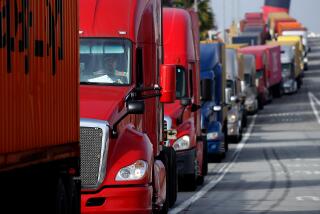California leads nation in ‘green jobs,’ study says
California continued to lead the nation in the number of people with “green jobs,” according to a study that looked at the growing influence of the so-called clean economy.
Nearly 320,000 people in the state work in such jobs as installing solar panels, making electric vehicles and running organic farms, the study by the Brookings Institution found. A little less than one-third, or about 90,000 of those jobs, are in the Los Angeles metropolitan area, it said.
Nationwide, the clean economy — characterized as goods and services with an environmental benefit — employs 2.7 million people. That’s more than the fossil fuel industry, the study researchers said.
“No swath of the economy has been more widely celebrated as a source of economic renewal and potential job creation,” the report said.
Brookings researchers included jobs in public mass transit and green waste management as well as those in more traditionally defined renewable energy industries such as wind turbines and solar panels.
The study is likely to draw more debate over what constitutes a “green” job. Even the study’s researchers called the concept of a clean economy an “enigma” that has been a lightning rod for legislators.
Researchers in the past have tried to define it by either limiting the category — looking at just alternative energy, for example — or broadening it so much that even tangentially related industries were included.
“In the absence of clear agreement and absolute clarity, people talk past each other, and controversy and confusion flourishes,” said Mark Muro, senior fellow and policy director of the Brookings Institution’s Metropolitan Policy Program.
Because of the ambiguity, proposals for a nationwide renewable energy standard have stalled and legislators have allowed federal incentives for developing green projects to expire.
That has allowed countries with strong national environmental policies such as China and Germany to leapfrog the U.S. in green investments and construction. While the overall U.S. economy expanded at a 4.2% annual rate between 2003 and 2010, the national clean economy grew just 3.4% annually, according to the Brookings study.
John Van Scoter, chief executive of Burbank solar company ESolar Inc., said that one of his customers likens green business in the United States to dealing with 50 countries.
“Each state has a different expectation and goal,” he said. “They’re very intermittent and they change at a whim. There’s nothing that project developers and financiers can put any confidence in.”
Focusing on regional growth could help, the Brookings report suggests.
In Los Angeles, some of the smallest segments are also the fastest growing. The metro area’s wind power sector grew 37% a year between 2003 and 2010 — from five workers to 45, the study said. Solar thermal and fuel cell companies also sprouted in the area, though many remain thinly staffed.
But the L.A. Basin, while second only to the New York metropolitan area in the number of green jobs, is still far behind many other states relative to the overall job market. Los Angeles is 58th in clean jobs per worker, ranking behind metro areas such as Grand Rapids, Mich., and Chattanooga, Tenn., with just 1.7% of working Angelenos in green positions.
And the median $40,910 annual income earned by Los Angeles green workers is lower than the $42,511 median for all L.A. jobs, according to the report. The median salary for a green worker in San Francisco is $59,896 and $45,016 in San Diego.
But the Los Angeles clean economy has a lot going for it, Muro said.
“Though it isn’t necessarily viewed as a clean-tech hotspot, when you’re as big as L.A. is, there’s a lot of expertise around,” he said. “It also happens to be a megalopolis in a state with a strong, pro-green policy framework.”
ESolar’s Van Scoter said as demand rises for solar installations, the company may hire dozens of people in the next year.
“We have an emerging industry in L.A. that has the potential to be quite strong,” he said. “There isn’t anything really structured and it’s nowhere near the fever pitch of Silicon Valley, but there’s a climate of wanting to help and a genuine, very local interest in supporting clean tech.”







